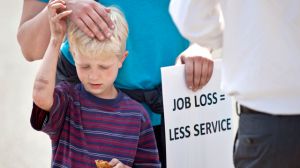
Marie Mulder holds her son, Jonah Spoelma, 6, while protesting in front of the Grand Rapids Public Library Tuesday, May 20, 2014. Library workers say plans to cut 18 jobs this summer will mean less service for area residents. (AP Photo/The Grand Rapids Press, Cory Morse)
In September, we highlighted a report by The Washington Post’s Josh Boak which found that rising income inequality was causing a “vicious cycle” for state budgets: The ability of the wealthiest one percent of households to shield much of their incomes from the tax man led to reduced tax revenues, which caused states to cut spending at the worst possible time — when consumer spending was down. The shrinking public sector’s drag on the economy has kept unemployment high, which in turn helped keep working people’s wages down and ultimately led to even greater income inequality.
On Monday, Elaine Povich reported another issue for state budget directors: volatility. It turns out the incomes of the one percent are “disproportionately affected by economic booms and busts” and for those states most dependent on income taxes, keeping track of the Jones’ income is a full-time job. As one Connecticut official told Povich, “we literally track 20 or so multi-millionaires. Any one of those people, depending on whether it’s a good year or a bad year, can have a noticeable impact on the revenue stream.” Povich explains:
The problem for states trying to predict revenues is that stock market fluctuations and other cyclical events have a larger impact on incomes at the top, causing revenues from income taxes and capital gains taxes to vary widely from year to year, according to a new report by Standard & Poor’s Rating Services. In most states, however, demands on the money keep accelerating….
The problem with tax stream volatility, according to Don Boyd, analyst with the Rockefeller Institute of Government, is that “it’s no way to run a government.”
“What does state and local government spend money on? K-12 education and health care for the elderly and very disabled,” he said. “When the revenue goes down, you don’t have a drop of kids in school and you don’t have a drop in elderly health treatment. You have to provide those services even when revenue falls off dramatically….”

